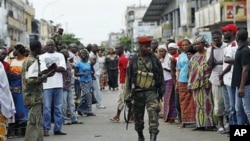The fighting is mostly over in Ivory Coast, but the humanitarian crisis is far from ending. Many thousands of people are displaced in the commercial capital, Abidjan, and its surroundings, as well as in the western part of the country. The needs are the same throughout the country – food, water, shelter and medical care.
How bad is it?
The U.N. refugee agency, UNHCR, is finally able to start its assessment of the extent of the humanitarian emergency. Fighting between supporters of former president Laurent Gbagbo and the winner of last November’s elections, Alassane Ouattara, had forced a shutdown of many of its operations.
“It seems like the worst of the fighting is over in Cote d’Ivoire, but unfortunately, the humanitarian situation, the security situation, is still fragile. And I think that now that we are able to be fully operational again we will be seeing the extent of the humanitarian crisis,” said UNHCR spokesperson Fatoumata Lejeune-Kaba.
UNHCR estimates about one million people have been displaced in and around Abidjan, with at least 200,000 displaced in the west.
“In the west,” she said, “there were lots of people who were in hiding in the bush. They’re just starting to come out now. We, ourselves, have been sending missions to areas where there’s been very little humanitarian presence for months. And we are discovering people that are really, really in terrible condition.”
In the town of Duekoue, about 30,000 people sought shelter at a Catholic mission, overwhelming its capability to care for them.
“We’re seeing lots of people dying,” she said. “Just Friday, the head of the Catholic mission was saying at least a person a day is dying for various causes...mainly various diseases like malaria, that could have been prevented.”
At this time, UNHCR has no formal camps set up in western Ivory Coast. Work was underway on one but it was disrupted by the violence. Work has now resumed. The displaced now at the Duekoue mission will eventually be sent there. Many say they want to return to their homes, but fear reprisals.
“Others feel that there are such bad memories that they don’t want to go back,” she said.
In Abidjan
UNHCR’s operation to register the displaced was stopped when fighting intensified in the city several weeks ago. Many of the sites that were set up to receive the displaced are now empty.
“The problem remains in the neighborhood of Yopougon, where there’s still some fighting, and we’re seeing people leave that area,’ said Lejeune-Kaba.
Many houses in the neighborhood have been destroyed or damaged, highlighting the need for shelter. “That’s one of the areas where UNHCR will be intervening heavily in Cote d’Ivoire, whether it’s Abidjan or in the west,” she said.
Oxfam
The humanitarian agency Oxfam has been helping Ivoirian refugees in Liberia for months, providing clean water and sanitation. Now, for the first time, it has a presence in Ivory Coast. Its headquarters is in the western town of Man, the scene of recent heavy fighting.
“The area is not entirely stable. In some spots there is still a lot of insecurity and there are some no-go areas, as far as we’re concerned at the moment,” said Oxfam spokesperson Caroline Gluck.
Assessment teams have been sent to areas where it’s safe to travel.
“I’ve been to some villages that were affected by the violence. For example in one neighborhood…where we are now doing some work to help the community clean up, it’s estimated about 90 percent of all the buildings there have been damaged in some way,” she said.
Many have been burned or looted. Some houses have had their windows knocked out or their roofs torn off.
Fear
“Very few people have the confidence at the moment to go back to start rebuilding. They believe that it’s still not safe enough for them to do so,” she said.
Oxfam is working with other agencies in helping the displaced at the Catholic mission in Duekoue, as well as the town of Guiglo. In some areas, Oxfam is trying to disinfect drinking wells or dig new ones.
“During the violence, some bodies were actually thrown into wells. The villagers don’t want to use these, but they want the bodies to be recovered and the wells to be closed. Psychologically, I think it’s just too traumatic for them to even consider using [them] as a water source,” she said.
While establishing clean water and sanitation facilities on an emergency basis, Oxfam also intends to work toward the long-term rehabilitation of communities and to provide economic opportunities.
“For example,” she said, “cash grants, restarting some markets and providing help to some of the most vulnerable. For example, women, widows, who’ve lost their husbands, who now no longer have an income earner in the family.”
Many of the displaced lack the basic necessities of clean water, food, sanitation and shelter. In Guiglo, for example, some people are sleeping outdoors as the rainy season begins. Medical care is also needed, including for those suffering from gunshot wounds.
“They’ve witnessed or experienced violence themselves or against their family members,” Gluk said.




